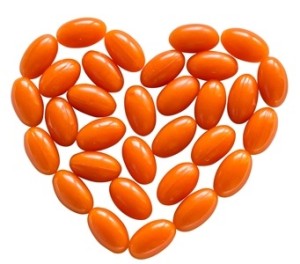The last time I wrote to you about melatonin I received quite a few emails regarding sleep problems.

I can totally sympathize with anyone having difficulty sleeping.
You see, I never thought I would encounter any issues sleeping because, prior to the last couple of years, I could sleep through a thunderstorm that shook the windows — the scary kind where the sky lights up the entire house.
My whole family would be up in the living room while I was snoring away.
They’d always ask me the next day, “Did you hear the storm?” I always replied with, “What storm?” or “It stormed?”
Ah, how I miss those days. No matter how stressed, I could sleep through anything.
Unfortunately, sometimes the aging process wreaks havoc on our sleep patterns. Changing hormones, certain medications and chronic illnesses are some reasons for restless nights1.
It certainly has chased away my sandman.
But, recently at work, I mentioned to a colleague how poorly I have been sleeping even though I was taking melatonin. She asked me if I was taking CoQ10. “For sleep?” I replied.
“Yes, Dr. Sears told me that CoQ10 supports healthy sleep patterns.” I didn’t get that memo.
Ironically, I had run out of my CoQ10 and kept forgetting to pick it up. No wonder I had a lack of energy too (more about energy in a minute).
I should have known better since it’s the supplement that Dr. Sears recommends the most.
But I’m not talking about regular CoQ10. I’m talking about Ultra Accel.
Ultra Accel is more powerful than regular CoQ10 because your average CoQ10 is made from ubiquinone. Ubiquinone is not easily absorbed into the blood stream so you have to take a lot in order for it to work.
But Dr. Sears’ Ultra Accel is made with a form of CoQ10 that is eight times more powerful and is easily absorbed. It’s called ubiquinol.
Ubiquinol re-energizes your cells2 (this is where the energy comes in). But not only did Dr. Sears make his CoQ10 product more powerful with ubiquinol, he also added something called pyrroloquinoline quinone (PQQ).
What PQQ and CoQ10 do for your cells is increase the production of mitochondria3.
Mitochondria is often referred to as the powerhouse of your cells. In essence, it is your cells’ batteries.
Like everything, as we age, our mitochondria declines making us feel tired. Think of it as your batteries running down.
That’s what’s so exciting about PQQ and CoQ10 – they have the ability to recharge your batteries (mitochondria).
I like to think of it as rebooting my internal computer.
So how does ubiquinol give you energy and help you sleep?
Sounds like an oxymoron. But it’s not, because the mitochondria in brain cells need energy to regulate sleep4.
Also, oxidative stress caused by free radicals can create poor sleep patterns. Ubiquinol and PQQ are antioxidants that help fight free radicals and reduce oxidative stress5.
In a recent study the “frequency of nocturnal awakening was significantly reduced in the control group and showed improvement of sleep quality compared with placebo”6.
Lack of sleep may cause:
- Depression
- Irritability
- Headaches
- Forgetfulness
- Difficulty in concentrating
- Accelerated aging
- Weight gain
I can promise you now that I won’t be forgetting my Ultra Accel ever again.
It’s your best defense against the elements of aging and poor sleep.
Don’t you want to recharge your batteries? It’s easy to try Ultra Accel risk-free because, if you are unhappy for any reason, you may call for an immediate refund. No questions asked.
So why wait for another sleepless night and no energy? Order here to get your Ultra Accel today!
For a more beautiful you!
Sandy
Sandy DeRose
P.S. I love hearing from you so please send me an email with any
questions or topics you’d like to read about.
P.P.S. If you missed the melatonin article you can read it here. It’s a little known anti-aging hormone.
References
1Nancy Foldvary-Schaefer, DO, Sleep and Aging. Cleveland Clinic Guide to Sleep Disorders.
2Hoppe U, et. al. “Coenzyme Q10, a cutaneous antioxidant and energizer.” Biofactors. 1999;9(2-4):371-8.
3Chowanadisai W, et al. Full text: Pyrroloquinoline quinone stimulates mitochondrial biogenesis through cAMP response element-binding protein phosphorylation and increased PGC-1 alpha expression. J Biol Chem. 2010 Jan 1;285:142-52.
4Gvozdjáková A, et al. Increased ubiquinone concentration after intracerebroventricularly-administered ubiquinol to selected rat brain regions. Gen Physiol Biophys. 2012 Dec;31(4):469-72. doi: 10.4149/gpb_2012_052.
5Prof. Yasuyoshi Watanabe, et al.KANEKA CORPORATION : Effect of Ubiquinol (reduced form of Coenzyme Q10) on Chronic Fatigue Syndrome (CFS) in double-blind placebo controlled stydy -Collaborative research with Osaka City University. presented at the 9th Annual Meeting of the Japanese Society of Fatigue Science held atAkita, Japan on June 7-8, 2013.
5Kei Ohwada, et al. Pyrroloquinoline Quinone (PQQ) Prevents Cognitive Deficit Caused by Oxidative Stress in Rats. J Clin Biochem Nutr. Jan 2008; 42(1): 29–34. Published online Dec 28, 2007. doi: 10.3164/jcbn.2008005.
6Prof. Yasuyoshi Watanabe, et al.KANEKA CORPORATION : Effect of Ubiquinol (reduced form of Coenzyme Q10) on Chronic Fatigue Syndrome (CFS) in double-blind placebo controlled stydy -Collaborative research with Osaka City University. presented at the 9th Annual Meeting of the Japanese Society of Fatigue Science held atAkita, Japan on June 7-8, 2013.